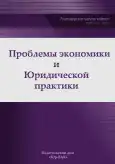Implementation of the Principles of Private International Law in Law Enforcement Practice
- Authors: Lukonkina O.V.1, Volchok A.A.1
-
Affiliations:
- Ogarev Mordovia State University
- Issue: Vol 19, No 1 (2023)
- Pages: 249-258
- Section: International Legal Sciences
- URL: https://journal-vniispk.ru/2541-8025/article/view/250148
- ID: 250148
Cite item
Abstract
This article analyzes the theoretical understanding of the and their implementation in law enforcement by analyzing the the problem of dividing the principles into general and special, clarifying the legal specifics of this differentiation is raised. The authors pay attention to the fact that the general are general principles of international law, both private and public, because they are enshrined in the «The Declaration on Principles of International Law concerning Friendly Relations and Co-operation among States». At the same time, special principles have received direct and formal expression in specific legal norms of national legislation, which contributes to their more effective implementation. Further, the authors analyze the principle of autonomy of will and its material embodiment in judicial decisions. Thus, there is a close connection between the positions of the law enforcement officer and the positions of legal scholars. Namely, the practically unlimited principle of autonomy of will, sometimes its literal understanding by the state, but from this it is closely dependent on the will of the state itself, and not on the full expression of the will of the parties, as it might seem at first glance. The authors also emphasize the existence of the concept of «implied» law in the execution of certain court decisions, when for one reason or another there is no indication of a specific applicable law and the court, based on the content or essence of the legal relationship that has arisen, makes a choice in favor of one of the legal systems. The positions of other researchers are confirmed that the principle of the closest connection is realized through such a criterion as «territoriality». In law enforcement acts, some other principles were also disclosed, which received a similar interpretation in the theory and legal consciousness of lawyers.
Full Text
##article.viewOnOriginalSite##About the authors
Olga V. Lukonkina
Ogarev Mordovia State University
Author for correspondence.
Email: makarkina1980@mail.ru
Cand. Sci. (Law)
Russian Federation, SaranskArtyom A. Volchok
Ogarev Mordovia State University
Email: eld.volchok@yandex.ru
Russian Federation, Saransk
References
- Aksenov A. G. Application of the principle of party autonomy (lex voluntatis) to the contract for international sale of goods // Vestnik Nizhegorodskogo universiteta im. N. I. Lobachevskogo. 2018. N3. P. 64–68.
- Getman-Pavlova I. V. International private law: a textbook for masters. Moscow: Izdatelstvo Yurajt, 2013. 959 p.
- Dmitrieva G. K. International private law: textbook. Moscow: Izdatelstvo «Prospekt», 2016. 680 p.
- Kotova L. V. To the question of the principles of private international law // Aktualnye problemy rossijskogo prava. 2007. N1. P. 688–693.
- Lomakina E. N., Petrov A. D., Glinshchikova T. V. Principle of the closest relationship in private international law // Byulleten nauki i praktiki. 2020. V. 6. N2. P. 268–272.
- Novikova T. V. Autonomy of will in private international law as an instrument to promote international economic intercourse // Permskij yuridicheskij almanax. 2020. N3. P. 205–220.
- Novikova T. V. Origins of acknowledgement by native legislation of autonomy of will as principle of private international law // Severo-Kavkazskij yuridicheskij vestnik. 2021. N2. P. 123–130.
- Novikova T. V. On the problem of Distinguishung between the Closest Connection Principle and Basic Conflict of Laws Rules // Aktualnye problemy rossijskogo prava. 2021. V. 16. N6 (127). P. 140–148
- Novikova T. V. The territorial Approach to the Content of the Closest connection Principle // Vestnik Tomskogo gosudarstvennogo universiteta. 2021. N464. P. 251–260.
- Romashev Yu. S. General Principles of Law in the System of International Law // Pravo. Zhurnal Vysshej shkoly ekonomiki. 2021. N3. P. 148–174.
- Sobolev I. D. Fundamental sources and principles of private international law // Vestnik Universiteta imeni O. E. Kutafina. 2015. N2 (6). P. 44–51.
- Strazheva V. V. On the Issue of the Principles of International Private Law // Epomen. 2018. N20. P. 174–181.
- Stone P. (2010) EU Private International Law, 2nd ed. Cheltenham: Elgar European Law—Edward Elgar, 562 p.
- Guangjian Tu. (2021) Macau Perspectives on the Hague Principles Governance and over-sight. Choice of Law in International Commercial Contracts: Global Perspectives on the Hague; Oxford University Press, 2021. 593 p.
- Kolb R. (2006) Principles as Sources of International Law (With Special Reference to Good Faith). Netherlands International Law Review, Cambridge University Press, vol. 53, № 1. pp. 1–36.
- Uerpmann-Wittzack R. (2010) Principles of International Internet Law. German Law Journal, Cambridge University Press, vol 11, № 11. pp. 1245–1263.
Supplementary files








